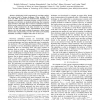Free Online Productivity Tools
i2Speak
i2Symbol
i2OCR
iTex2Img
iWeb2Print
iWeb2Shot
i2Type
iPdf2Split
iPdf2Merge
i2Bopomofo
i2Arabic
i2Style
i2Image
i2PDF
iLatex2Rtf
Sci2ools
113
Voted
DATE
2010
IEEE
2010
IEEE
Worst case delay analysis for memory interference in multicore systems
Abstract—Employing COTS components in real-time embedded systems leads to timing challenges. When multiple CPU cores and DMA peripherals run simultaneously, contention for access to main memory can greatly increase a task’s WCET. In this paper, we introduce an analysis methodology that computes upper bounds to task delay due to memory contention. First, an arrival curve is derived for each core representing the maximum memory traffic produced by all tasks executed on it. Arrival curves are then combined with a representation of the cache behavior for the task under analysis to generate a delay bound. Based on the computed delay, we show how tasks can be feasibly scheduled according to assigned time slots on each core.
| Added | 10 Jul 2010 |
| Updated | 10 Jul 2010 |
| Type | Conference |
| Year | 2010 |
| Where | DATE |
| Authors | Rodolfo Pellizzoni, Andreas Schranzhofer, Jian-Jia Chen, Marco Caccamo, Lothar Thiele |
Comments (0)

